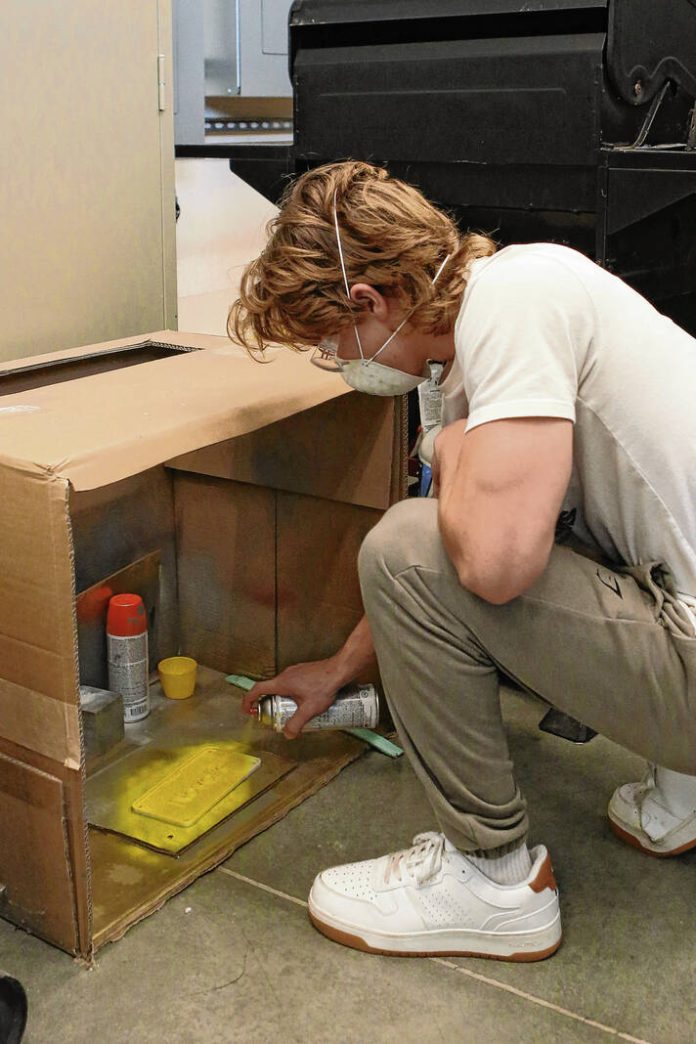
Garrett Braden paints the license plate for one of the toy cars being customized for kids with disabilities for the Go Baby Go powered mobility program on Oct. 19 at Advanced Manufacturing Center of Excellence (ACME) in Columbus.
Local partners are working to provide a new way to get around for children who have mobility impairments.
Purdue Polytechnic Columbus, Cummins Inc., the Arc of Bartholomew County, Assisted Independence and local physical therapist Rebecca Scholl are collaborating on a project that involves customizing battery-operated ride-on cars to meet the needs of three children. Once complete, the cars will be provided to the children — who are 2 to 5 years old — at no cost to their families, organizers said.
“Cummins is purchasing all of the equipment needed to build a electric motorized vehicle for the child to be able to control on their own,” said Lollar. “And so we will be customizing — our ENGT 182 Gateway to Engineering class will be putting together or building this car for each specific child.”
The project began in late September and will culminate in December when students present the cars to their young owners. Lollar said they plan to have a race track set up for the kids to test out their cars.
The endeavor is a local version of the GoBabyGo project, which started at the University of Delaware and has been adopted by schools and service groups around the world.
According to the Cerebral Palsy Foundation, “The modified toy cars give children with mobility disabilities a chance to play and socialize with their peers more easily. Past research has shown that independent mobility is linked to cognitive, social, motor, language and other developmental benefits in young children. Being pushed in a stroller or being carried from one place to another is fundamentally different from having active control over one’s own exploration, which is where the developmental gains are seen.”
Scholl, a physical therapist with the Bartholomew Consolidated School Corp., found out about GoBabyGo during a previous job in Ohio.
Last year, she became interested in offering the program to some of the students she worked with.
“And I happened to be sitting between Dave Ruch from Cummins, who’s also helping with this project, and somebody that had been my son’s soccer coach but also an adjunct professor at Purdue before he retired last year,” Scholl recalled. “… I said, ‘I have a project for you guys, what do you think?’ The Purdue thing kind of fell away last year, but Dave took it to Cummins. Cummins thought it was a good idea. We kind of did a trial last year and made two cars that Cummins was great about helping get together. I worked with one of their engineers and we did the builds on our own.”
Scholl added that while she works for BCSC, the school corporation is not involved with this project.
After last year’s builds, Cummins wanted to keep going with the project, she said. However, the company said that they needed to work with a community agency on the program, so Scholl reached out to Purdue about getting involved.
She also spoke with executive director Grace Kestler about the Arc potentially partnering as well. The idea was that Scholl could put information on the Arc’s website if the local GoBabyGo program is able to make more builds. However, Scholl said that this will probably be the only year they’re involved.
“Grace is the one that mentioned Assisted Independence as possibly a better fit than the Arc, brought them into the future,” she said. “And they have been great, and I think that would be a fantastic partnership. I’m really interested in exploring that even more, which I think would take the Arc out.”
Assisted Independence is providing support for the project, Scholl said. Additionally, moving forward, they will help with creativity and aesthetics — as well as potentially sharing information about GoBabyGo on their website if the local program is able to continue.
In regards to the children receiving cars, Scholl said that last year’s participants were two students she had worked with at BCSC and thought could be more independent if they had “some form of powered mobility.”
This year, she reached out to someone from A Step Ahead Pediatric Therapy for ideas on families that might be interested. Her contact suggested two children, including one of Scholl’s students, and she found out about another candidate by coincidence.
Scholl happened to be in a nail salon when she heard one of the technicians talking about her son and his disabilities. After learning more about the child and meeting him for an evaluation, Scholl found that he was a good fit for a program, so he was added to the group.
“We’re really excited about this opportunity,” said Lollar. “So eventually hoping that it will expand into something that we do every year.”
Scholl likewise hopes that it will become more than just a fall semester project.
She added that each car is more than a toy; it’s a tool to help the child become more independent.
“Research shows that communication skills, social skills, body awareness skills — all are built through independent mobility, because you learn so much about yourself and space,” she said. “You bump into something. If you can’t get into the box or underneath the chair, you figure that out. You become more autonomous, you have all of these things when you start moving. And 18-month-old kids can move the length of seven football fields in one hour. And our kids that aren’t moving independently, especially not walking independently, don’t have the same experience with this. … The earlier I can get kids to have some form of independent control over what they can do, the better chance they can have at staying up with their peers or catching up with their peers.”




